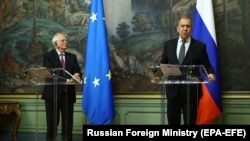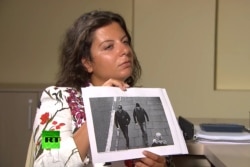During a news conference in Vienna last week, Russian Foreign Minister Sergey Lavrov said the relations between the European Union (EU) and Russia were awful.
“We paid particular attention to developments on the European continent, including the deplorable situation in relations between Russia and the European Union,” Lavrov said, according to the Russian state news agency TASS.
“Contacts with Brussels have been reduced to a minimum as a result of the EU’s policy aimed at containing Russia.”
Lavrov’s insinuation that blame lies with Brussels is false. In fact, Russia’s aggressive behavior in Ukraine and other EU states explains and instigated the breakdown.
The initial cause was Russia’s invasion and occupation of part of Ukraine in 2014 following that country’s Maidan Revolution, which ousted its Russian-backed president after he refused to sign a free-trade deal with the EU.
Since then, Russia has conducted malign activities targeting European Union member states, some of these activities carried out on their territory.
Disinfo Campaigns
Russia has run disinformation campaigns through its foreign-language state media, like RT (formerly Russia Today) and Sputnik, as well as smaller outlets, blogs and social media accounts.
The disinformation became so pervasive that in 2015, the European External Action Service created a monitoring service known as EUvsDisinfo, which monitors, tracks and debunks Russian-originated disinformation aimed at EU member states and other European states along the EU’s periphery. The site’s database contains more than 12,000 examples of Russian disinformation.
Russian disinfo themes vary depending on the targeted country, but they commonly claim that the EU and North Atlantic Treaty Organization (NATO) are bad for European countries, that Europe shouldn’t support Ukraine and that Russia is a better partner than Brussels. Russian disinfo frequently disseminates false conspiracy theories as well.
Two major cases in the past seven years stand out. One was the 2016 story of “Liza,” a 13-year-old Russian girl living in Germany who, according to Russian state media, was abducted and sexually abused by a Middle Eastern refugee. The story was false, but Russian state media and even the Russian Foreign Ministry accused the German authorities of covering up the truth.
Though fabricated, the story sparked anti-refugee protests throughout Germany, which according to Open Democracy were attended by between 10,000 and 20,000 people, mostly Russian-speaking residents.
Assassination
Beyond disinfo campaigns, assassinations and attempted assassinations in EU member states have been traced back to Russia.
One of the most high-profile cases occurred in 2018 in Britain, then still formally in the EU. Ex-Russian spy Sergey Skripal and his daughter Yulia were poisoned in the city of Salisbury with the Soviet-era nerve agent known as Novichok. They were hospitalized and recovered, but two British citizens who had accidentally come into contact with the discarded poison container were also sickened. One of them, Dawn Sturgess, died.
U.K. authorities collected video of the suspected assassins and identified them as Russian nationals. After Russian state media interviewed the two men, who claimed innocence, open-source intelligence (OSINT) investigators at Bellingcat identified them.
Although they traveled to the U.K. under the false names Alexander Petrov and Ruslan Boshirov (which they also used during their interview on Russian state TV), investigators were able to identify them as Anatoly Chepiga and Alexander Mishkin, operatives of the GRU, Russia’s military intelligence agency. Earlier this year, it was discovered that Chepiga and Mishkin may have had a hand in the 2015 attempted assassination of Emilian Gebrev, a Bulgarian arms dealer.
In 2019, Zelimkhan Khangoshvili, an ethnic-Chechen from Georgia who had fought against Russia during the Second Chechen War, was assassinated by gunshot in a Berlin park. German authorities and OSINT investigators confirmed the suspected assassin was a Russian citizen with past ties to Russia’s Federal Security Service (FSB).
In 2020, Mamikhan Umarov, a Chechen dissident and outspoken critic of Chechen leader Ramzan Kadyrov, was assassinated in Vienna. An ethnic Chechen from Russia was convicted in the case.
That same year, an assassination attempt on a Chechen dissident blogger in Poland was foiled thanks to the would-be victim’s self-defense. The would-be assassin said he had traveled from Moscow and had been ordered to carry out the attack.
Explosions
In April, Czech authorities revealed that Anatoly Chepiga and Alexander Mishkin, of Skripal and Gebrev poisonings fame, had been identified as suspects in explosions at two ammunition storage facilities near the Czech town of Vrbetice in 2014. The explosions killed two people. Czech police determined that the two men were in their country around the time of the blasts and had applied for access to the facilities where the blasts occurred using false identities.






